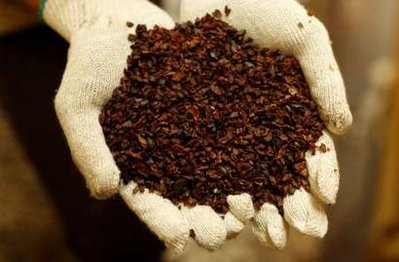
Reuters @ Yahoo via my spouse, Vonne.
An interesting public-private partnership here:
Candy maker Mars Inc., computer company IBM Corp. and the U.S. Department of Agriculture have mapped the cacao genome in an effort to improve cocoa crop quality and sustain the world's supply of the key ingredient for chocolate.
The companies and the USDA's Agricultural Research Service (USDA-ARS) on Wednesday released the preliminary genome sequence for the cacao tree, which produces cocoa beans used to make chocolate.
The goal:
The results of this collaborative project -- delivered three years early due to Mars' scientific leadership, advances in genome technology and constant real-time collaboration -- marks a significant scientific milestone that is already starting to benefit millions of farmers, particularly in West Africa, where more than 70 percent of the world's cocoa crop is produced.
"The collaboration with Mars and the USDA-ARS leverages more than a decade of IBM Research's experience in computational biology, as well as the power of the Blue Gene supercomputer," said Ajay Royyuru, senior manager, IBM Computational Biology Center.
The kicker:
The results of the research will be made available to the public with permanent access via the Cacao Genome Database www.cacaogenomedb.org.
To me, that's a counter-intuitive choice by Mars, a privately held company. I'll be curious to see if this precedent encourages other private sector gifts of this size to the scientific community, because, in my opinion, this is what sustainable resource utilization is all about.
A much bigger global middle class will want to consumer a whole lot more chocolate. Mars will logically seek to capture as much of that growing market as possible, but it took the time and effort here to make this downpayment on our collective future.
And I admire that.